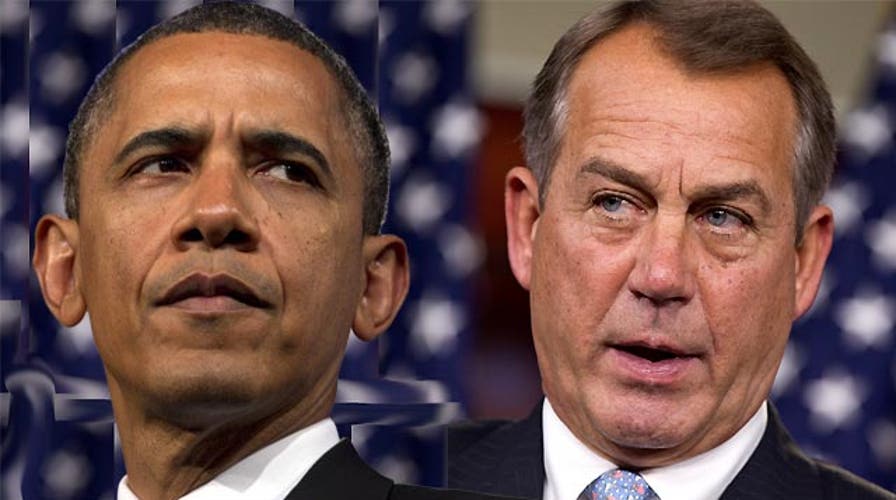House Speaker John Boehner abruptly pulled his “Plan B” tax rate bill from the floor Thursday night, after struggling to garner support from fellow Republicans -- leaving lawmakers once again without a vehicle for averting the looming fiscal crisis and the public facing an imminent tax hike.
The surprise decision capped a tumultuous day on Capitol Hill. Over Democrats’ vocal objections, Republican leaders had pressed forward with two bills that composed what Boehner called his “Plan B.” The first, a plan to replace automatic spending cuts set to hit next month, narrowly passed Thursday evening on a 215-209 vote.
But, in a move that signaled turmoil in the Republican caucus, the House was called into recess right before the scheduled vote on Boehner’s other bill -- to prevent tax hikes on all but those making more than $1 million. Republican leaders called an emergency meeting and it was apparently clear within minutes Boehner did not have enough support, with some Republicans still opposed to raising rates on anybody.
The speaker, unceremoniously and with no indication as to whether it might be rescheduled, then put off the vote as he prodded the Senate to act.
"The House did not take up the tax measure today because it did not have sufficient support from our members to pass,” Boehner said in a statement. “Now it is up to the president to work with Senator Reid on legislation to avert the fiscal cliff.”
Boehner noted the House had already passed legislation to stop all tax rate increases, in addition to the spending cuts bill. He concluded: “The Senate must now act."
The tumult raised even more questions about how lawmakers, if at all, might be able to avoid the crushing wave of tax hikes and spending cuts poised to hit at the beginning of January. Lawmakers were sent home for the holidays, told they would be given 48 hours notice to return if anything changes.
Democrats used the chaos to press Boehner to reach out to Democrats, claiming the night's events proved he cannot get his members in line. Boehner lost 21 Republicans on the spending cuts bill, and lawmakers later claimed at least 40 Republicans came out against the tax plan -- enough to scuttle the bill absent Democratic backing.
In a statement Thursday night, the White House said the "President will work with Congress to get this done and we are hopeful that we will be able to find a bipartisan solution quickly that protects the middle class and our economy."
Some Republicans, more immediately, expressed concern about what the development would mean for the markets Friday morning. “This is a bad night for the country,” Rep. Steven LaTourette, R-Ohio, said.
The House bills, though, had been adamantly opposed anyway by Democrats in both chambers.
Senate Democratic Leader Harry Reid said Thursday that the Senate would not take up the House bills.
White House Press Secretary Jay Carney reiterated that "the president would veto it if it got to his desk."
After the House passed its first bill, to replace sweeping cuts to defense with cuts elsewhere in the budget, the White House again issued a formal veto threat.
Carney derisively described the votes Thursday as a "multi-day exercise in futility."
If anything, the outcome Thursday night continued the rapid unraveling of a potential compromise.
Boehner and Obama had until early this week been engaged in seemingly productive talks toward a compromise package. The move to draft a "Plan B" might have been aimed at strengthening Boehner's negotiating position, as he tries to extract more spending cuts and more modest tax rate hikes from the White House as part of any deal. But Democrats were so angered by the new proposal that the future of talks is unclear.
On the sidelines, senior administration officials were claiming Thursday that Boehner turned to "Plan B" because he concluded he couldn't garner enough support for Obama's counterproposal in the House. That proposal would raise taxes only on income above $400,000, though Carney indicated that might not be Obama's final offer.
Boehner spokesman Michael Steel called the theory "stupid and untrue." He said Boehner was always clear "that he could not support the president's plan, let alone recommend it to members of the House."
Boehner claimed Thursday that the problem is Obama is "unwilling to stand up to his own party" and demand serious spending cuts. "I did my part -- they did nothing," Boehner said, referencing his willingness to discuss raising tax rates.
Senior administration officials accused Boehner of at least temporarily derailing fiscal talks with the "Plan B" move. During his own press conference Wednesday, Obama urged Republicans to "peel off the partisan war paint."
Republicans, though, said the White House was being unreasonable. Republican House leaders said it's important for Washington to have an alternative plan just in case Boehner and Obama cannot come to an agreement.
But with that plan failing to even reach a vote, it’s unclear whether Boehner and Obama will return to the negotiating table -- or, as Boehner’s statement implied, the House might simply await action on the Senate side.





